Dune Book Review
After years of talking about Dune and its sequels by Frank Herbert, I’ve come to appreciate why the book is good enough to come back to again and again. The last time I read Frank Herbert’s Dune was about a decade ago, and I’ve spent that time honing my taste in books and my analytical toolkit for understanding why I like the things that I do.
Now I can see that Dune is great because it is a successful hybrid of the method of “hard” science fiction, a story that educates the reader in some principle of science or engineering while otherwise being an adventure, with the least utilized of Northrop Frye’s four mythoi in mid-twentieth century science fiction, tragedy.
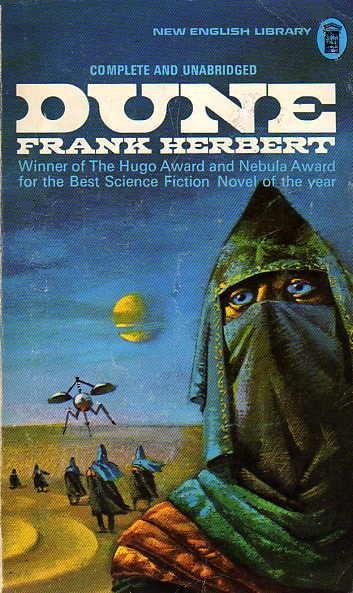
Re-reading Dune after something like a decade, I am struck by how brief and allusive Herbert’s worldbuilding is. Things like mentats, the Butlerian Jihad, the Bene Gesserit, and even Arrakis itself are mostly sketched out in just the first fifty pages. A ton of exposition is conducted by means of conversations, although this tendency decreases somewhat as Herbert gets his setting established.
If you compare Dune to the short stories that previously dominated the science fiction market, it must have seemed like a weighty tome indeed. But by today’s doorstopper book standards, Herbert’s story is sparse and tightly written. Herbert gets more done in this one book than most contemporary authors could do in a trilogy.
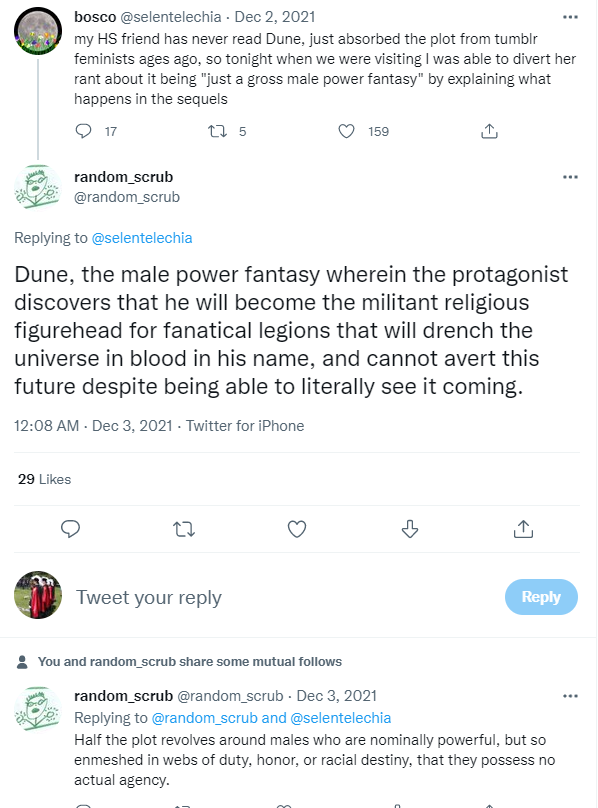
In a way, I can see the argument that Dune is an typical adventure story, insofar as it really does have an arc consisting of the unjust death of a father, followed by the son working out his revenge from the shadows. It ends with the bad guy getting dead, and the hero marries the princess. But this is not happily ever after; everything is shot through with sadness.
Frye defined the ancient mythoi of tragedy as:
Pathos or catastrophe, whether in triumph or in defeat, is the archetypal theme of tragedy.
Oftentimes in tragedy, triumph and defeat are in fact the same thing considered from different points of view, and that is what we see here. Paul Atreides, the product of thousands of years of eugenics, a man who can literally see the future, cannot avert the disaster he not only sees coming, but creates through his own actions. In a way, Paul achieves everything he aims to do; the cost is only everything.
For me, the sense of tragedy is best illustrated not by Paul, but by his father, Duke Leto Atreides. Duke Leto was masterfully played by Oscar Isaac in the recent Denis Villeneuve movie adaption of the first half of Herbert’s novel. Isaac’s gravitas is perfect for the Duke, perhaps the best man in the aristocratic Landsraad assembly that comprises one of the three pillars of Dune’s futuristic society.
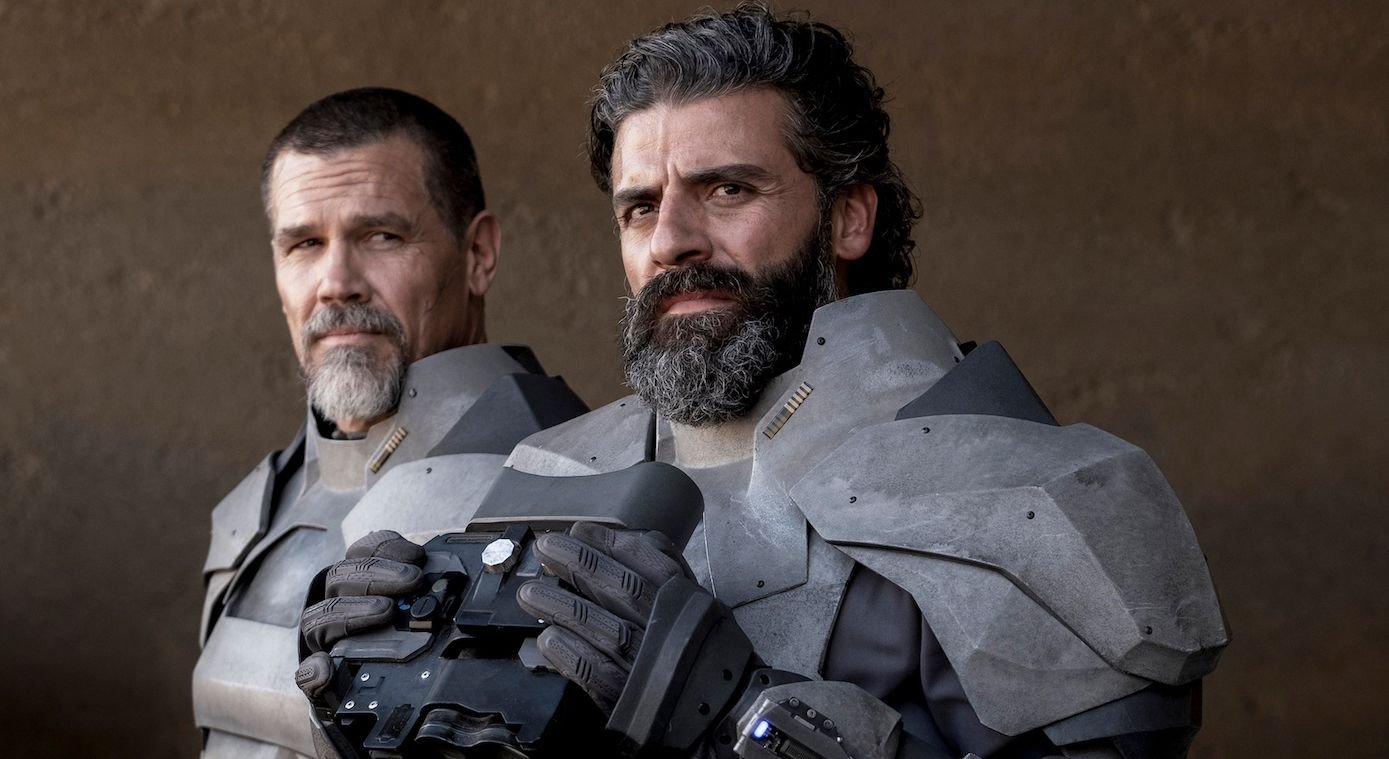
Duke Leto represents a more humane future for the Imperium, one that will never be because the best man, in ordinary terms, is simply inadequate to the task. Despite being an enthusiastic participant in the Byzantine politics of the Imperium, Leto cannot see just how devious and depraved his enemies are because of his essential nobility. Leto is loved by his peers and his subordinates for that nobility; even the Padishah Emperor who allies with the grasping Baron Harkonnen to destroy Leto wishes that Leto was his son.
This is of course possible, because despite Leto’s love for Paul’s mother, she is officially a concubine, in order to allow precisely the kind of Habsburg-style political marriage that could have made Leto the Emperor’s son. Or at the very least the Emperor could have married off the same daughter to Paul who eventually claimed her by right of conquest. But the Emperor cannot do this, because he is beholden to the eugenic scheming of the Bene Gesserit.
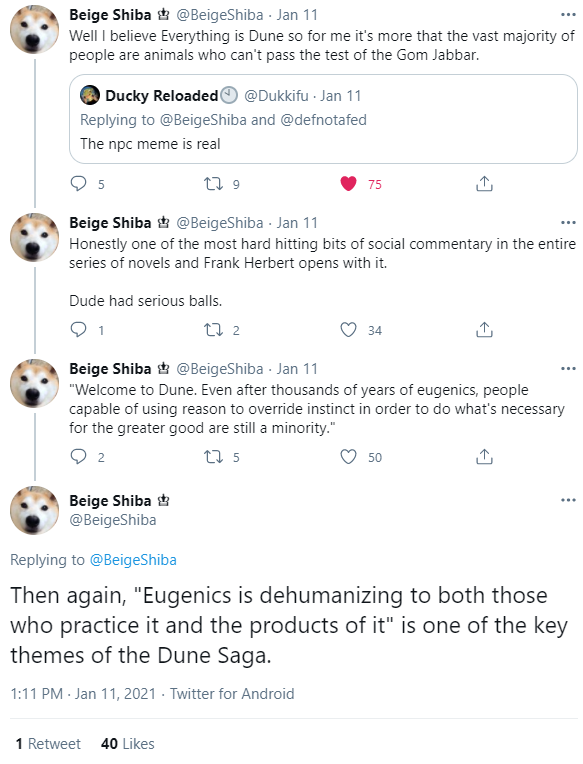
The Bene Gesserit are so obsessed with creating the Kwisatz Haderach that they cannot allow for this routine instrument of diplomacy to be used, even to save the Imperium from destruction. And in so doing, the Bene Gesserit foster not only that destruction, but the unraveling of all their own plans. Beige Shiba correctly noted that one of the key themes of the Dune books is “eugenics is dehumanizing to both those who practice it and the products of it”.
Thus Paul is both greater and lesser than his father. Greater, because he can revenge the death of his father and frustrate the wicked schemes that brought Duke Leto down, but lesser because Paul is not loved by his followers, but worshipped instead. Paul lost the nobility and magnanimity of his father. This theme runs even to the relationship between Paul and his mother, the Lady Jessica. Jessica is disturbed at what Paul has become, while Paul is resentful at what he has been made to be. And like his father, but at the same time disturbingly unlike, Paul must put aside the woman of his heart in order to allow for a dynastic marriage.
In order to get a feel for just how successful Herbert was at creating this tragedy, I think it is useful to contrast Dune with two other popular works that attempted tragedy and failed: G. R. R. Martin’s A Song of Ice and Fire and George Lucas’ Star Wars prequels.
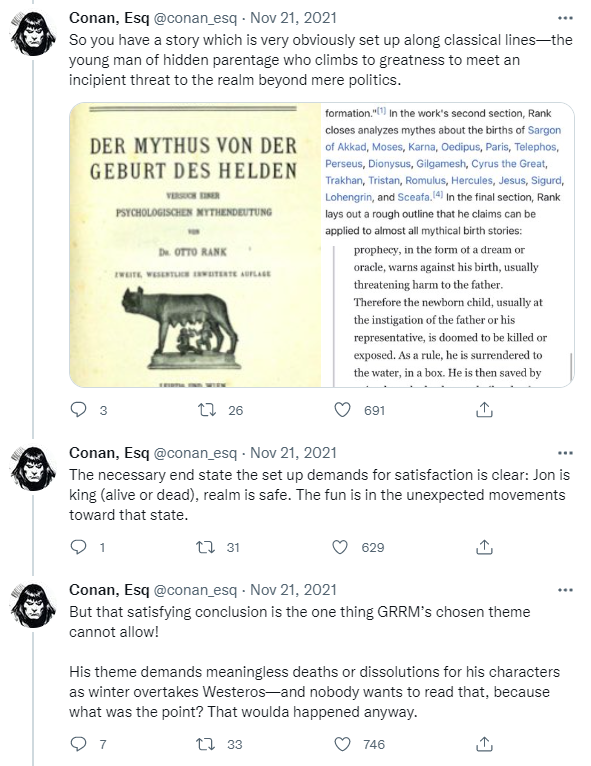
Martin failed for structural reasons, by trying to cram absurdity into classical heroism, as Conan_esq has pointed out at length. Lucas’ failure is more interesting, because he actually almost succeeded. My best guess as to the cause of this is that Lucas simply had no one who could tell him no, or take a red-pen to his ideas and sharpen them up. Lucas’ visuals remain spectacular, but he was weaker in the writing and ideas departments. on the other hand, no amount of red pen could fix Martin’s mess.
Herbert, on the other hand, had so much trouble getting Dune published that he eventually turned to Chilton Books, the auto repair manual company, to publish his masterpiece. Herbert spent years honing his craft, and you can see the results for yourself. I think Dune may be the finest science fiction tragedy of the twentieth century, and I’m going to read the rest of Frank’s books to see him flesh out his ideas.



Comments ()